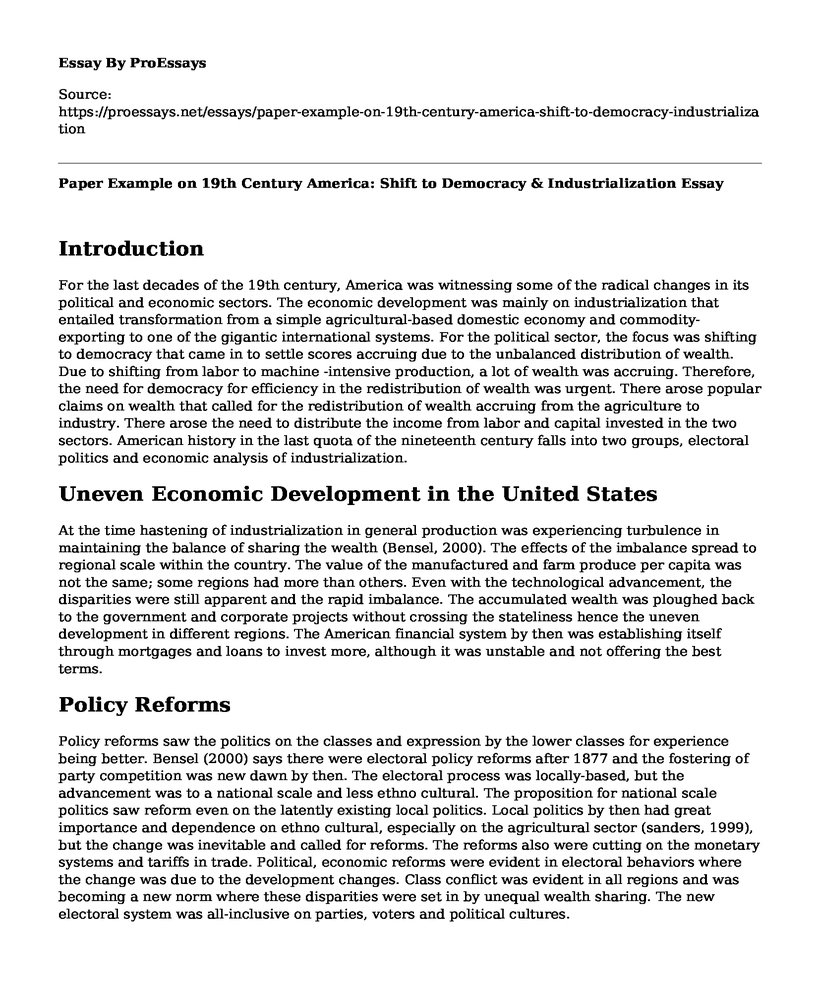Introduction
For the last decades of the 19th century, America was witnessing some of the radical changes in its political and economic sectors. The economic development was mainly on industrialization that entailed transformation from a simple agricultural-based domestic economy and commodity-exporting to one of the gigantic international systems. For the political sector, the focus was shifting to democracy that came in to settle scores accruing due to the unbalanced distribution of wealth. Due to shifting from labor to machine -intensive production, a lot of wealth was accruing. Therefore, the need for democracy for efficiency in the redistribution of wealth was urgent. There arose popular claims on wealth that called for the redistribution of wealth accruing from the agriculture to industry. There arose the need to distribute the income from labor and capital invested in the two sectors. American history in the last quota of the nineteenth century falls into two groups, electoral politics and economic analysis of industrialization.
Uneven Economic Development in the United States
At the time hastening of industrialization in general production was experiencing turbulence in maintaining the balance of sharing the wealth (Bensel, 2000). The effects of the imbalance spread to regional scale within the country. The value of the manufactured and farm produce per capita was not the same; some regions had more than others. Even with the technological advancement, the disparities were still apparent and the rapid imbalance. The accumulated wealth was ploughed back to the government and corporate projects without crossing the stateliness hence the uneven development in different regions. The American financial system by then was establishing itself through mortgages and loans to invest more, although it was unstable and not offering the best terms.
Policy Reforms
Policy reforms saw the politics on the classes and expression by the lower classes for experience being better. Bensel (2000) says there were electoral policy reforms after 1877 and the fostering of party competition was new dawn by then. The electoral process was locally-based, but the advancement was to a national scale and less ethno cultural. The proposition for national scale politics saw reform even on the latently existing local politics. Local politics by then had great importance and dependence on ethno cultural, especially on the agricultural sector (sanders, 1999), but the change was inevitable and called for reforms. The reforms also were cutting on the monetary systems and tariffs in trade. Political, economic reforms were evident in electoral behaviors where the change was due to the development changes. Class conflict was evident in all regions and was becoming a new norm where these disparities were set in by unequal wealth sharing. The new electoral system was all-inclusive on parties, voters and political cultures.
Republican Developmental Tripod
America went through an unregulated national market that was ensuring freedom in the system of economic exchange (Bensel, 2000). The unregulated market entailed minimal taxes, tariffs and quotas were cumulatively getting minimal in the centralized economy. The national market was getting consolidated and acting in unison to facilitate a healthy economic environment. Through consolidation, the role of the Supreme Court was dominant in constructing the market economy.
The monetary system was getting reforms and adopted the gold standard. The gold standard policy is a monetary system where the value of the currency links with the prevailing gold value. This policy was later incorporating to an analysis of the legislative coalition and the persistent need for a gold standard policy. This policy was in between the prevailing standard of monetary value and the implications for economic development.
Tariffs were experiencing reforms on what class of imports and exports to act on. There were major development policies in place by then that was introduced to improve on development. The national Republican coalition was focusing on making trade protection more central and healthier. With such an environment for trade, the policies of tariffs and quotas were favorable for economic growth.
Political Economy
There were emergent issues in labor intensive farms that entailed installing a political class for representation (Sanders, 1999). The issues were embracing protective tariffs, cheap land and military expenditures that were somehow turning into regional agendas that favored some regions than others. Need for balanced development called in for political representation of the people and a political class. The vast sectors became drivers of the economy in the last decade of the century, and a new phase of the revolution was showing results. The American manufacturing sector became more stable and complex than ever before. The population in the industries was getting bigger, and mild politics started setting in from labor movements and micro association. This complexity called for representation through politics.
Conclusion
Political economy is simply the interrelation of economic aspects to the role of politics. Politics in the late nineteenth century were mainly revolving around the hastening industrialization in the country. The representation meant that issues with workers, unfavorable policies and working conditions were going through policy reforms and making. The increased population called for Electoral reforms for better associations and integration in the new age of industrialization.
References
Bensel, R. F. (2000). The political economy of American industrialization, 1877-1900. Cambridge University Press.
Sanders, E. (1999). Roots of reform: farmers, workers, and the American state, 1877-1917. University of Chicago Press.
Cite this page
Paper Example on 19th Century America: Shift to Democracy & Industrialization. (2023, Mar 02). Retrieved from https://proessays.net/essays/paper-example-on-19th-century-america-shift-to-democracy-industrialization
If you are the original author of this essay and no longer wish to have it published on the ProEssays website, please click below to request its removal:
- Research Paper on Roman Empire and Egyptian Empire
- Economic Policies for Developing Countries Paper Example
- Essay Sample on Middle Powers: A Strategic Alternative to Superpowers
- Realpolitik vs Liberalism: Comparing Practical Politics & Cooperation - Essay Sample
- Essay on US Govt's WWII Decision to Draft Japanese-Americans: Justified?
- Essay Example on Cold War: US-USSR Power Tension After WWII
- Essay Example on Trump's 2017 NSS: A Roadmap for US Prosperity & Security







